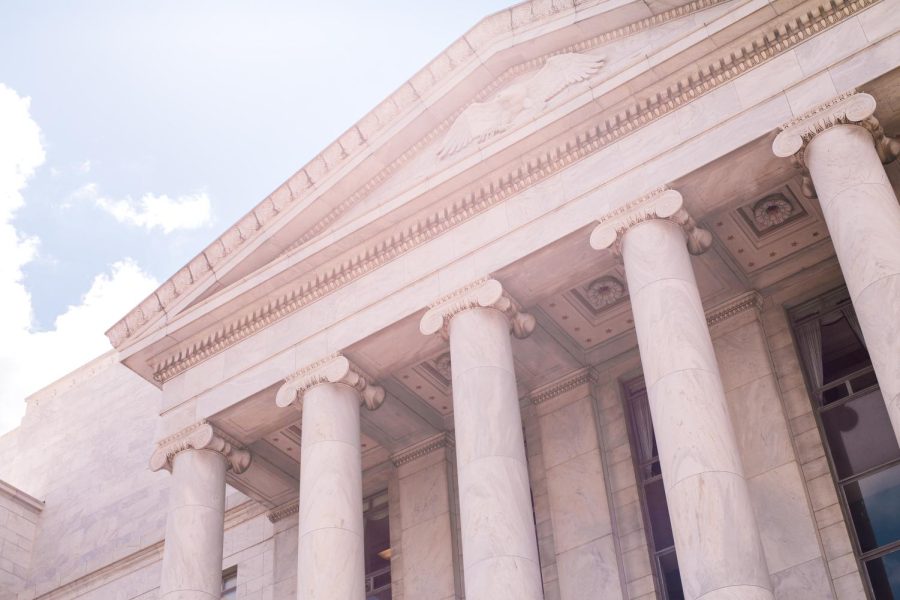OPINION: Inflation Reduction Act—Joe Manchin finally got his wish
This Capitol building is where the Inflation Reduction Act was filed and voted on. Photo by Katie Moum on Unsplash
September 7, 2022
When Senators Chuck Schumer (D-NY) and Joe Manchin (D-WV) laid out an economic proposal in early April, few would’ve expected it to be signed into legislation by mid-August. The Inflation Reduction Act was a stripped-down version of the previously touted Build Back Better plan, a Biden initiative hamstrung by Manchin and his bipartisan agenda.
Manchin has a special place in Congress, as he is a long-time Democratic candidate in one of the reddest states in America. He keeps his place by appealing to both sides when it suits him; one day he is supporting coal mining subsidies, and the next he is lobbying to tax the top 1%. He is also the 50th Democrat in Congress, making him a vital swing vote to decide the fate of major bills such as the Build Back Better plan. Until the midterm elections later this year, the Democrats must placate Manchin and his centrist paragon and hope that they can make some progress with the current economic issues at hand.
Despite the current inflation crisis within America and the aptly named bill regarding it, the Inflation Reduction Act does little to truly combat short-term price hikes. The bill does, however, address concerns over the national deficit, climate change and private healthcare.
The national deficit is expected to be cut by around $300 billion over the next ten years. This is achieved by bringing in roughly $737 billion, mostly through a 15% minimum corporate tax, prescription drug reform and IRS investments. The corporate tax would force businesses making over $400,000 a year to give at least 15% of their revenue towards the bill. The IRS investment would also hamper tax loopholes among the rich, while working to enforce the new laws put into place.
The drug reform would cap insulin prices at $35 a month, compared to the Martin Shkreli days of a whopping $750 a pill for life-saving medication. It would also cap out-of-pocket drug costs at $2,000 by 2025 and let Medicare negotiate drug prices with private companies. This could signal the government taking back some control over healthcare in America, which has been run into the ground over the past few decades by the Martin Shkreli’s of the world.
While around $737 billion is being spent, around $437 billion is being invested into climate change, as well as drought restoration on the West Coast.
For climate change, they have drafted the largest renewable energy investment in U.S history. It includes a pledge to reduce carbon emissions by at least 40% by 2030, while also giving tax credits to clean energy uses within the household along with subsidies to help major fossil fuel companies go clean. A $7,500 tax credit is being supplied to homeowners who purchase a brand-new electric vehicle. Around $60 billion is being spent to create manufacturing jobs on new windmills, turbines and solar panels. This money is also being invested into “environmental justice” within disadvantaged communities, helping them recover from pollution brought on by major fossil fuel companies.
However, this still does not fix the concerning issue of extreme oil and gas prices within the country. Tax credits to companies like Chevron and ExxonMobil are supposedly meant to help divert their resources towards carbon-capturing and hydrogen-producing technology. While this may lead to slightly less dependence on fossil fuels in the long term, it will not change prices for the average consumer. These subsidies also crowd out smaller companies looking to delve into the fuel market, leaving the current elite class of energy corporations as the only ones left with the money required to operate.
These new regulations won’t slow down mega-corporations because they can just migrate to foreign markets in Asia or Africa who are begging for reliable fossil fuel usage. It may help the environment but only at the cost of lining the pockets of the people who decimated it initially.
This is where Manchin comes into play. His main goal is to keep the massive fuel enterprises fixed with money and operating advantages. Red-state Democrats gain the majority of their funding through lobbying done by energy firms. Keeping the Chevron’s of the world happy helps Manchin keep his precarious position in the Senate a little more secure.
Manchin himself is the most extreme case of effective lobbying. For oil and gas lobbying, he earns over twice the amount of every other senator. For natural gas, he earns almost three times more than the next Congress member. For coal mining, his state’s specialty, Manchin receives over twice the funds as the next Democratic senator. With Manchin’s position within Congress, these wealthy benefactors almost single handedly decide what does or doesn’t get passed within our country.
Joe Manchin may have gotten his wish, but at what cost?









